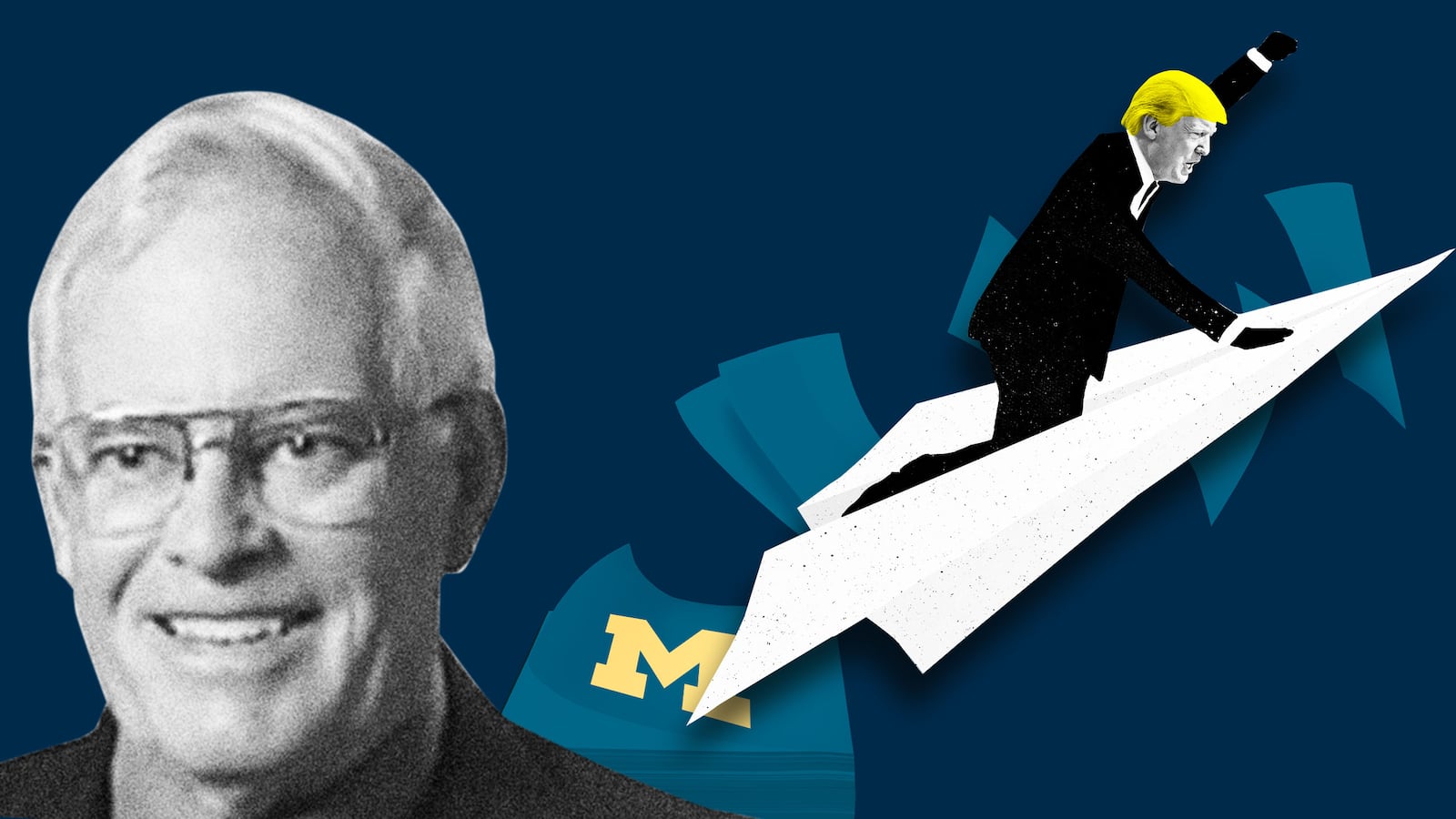The University of Michigan is fighting to keep a shroud of secrecy around the papers of an anti-immigration thought leader who founded organizations that have ties to prominent Trump associates.
Leading the charge to make John Tanton’s documents public is a Virginia-based immigration lawyer who has filed freedom-of-information requests and a lawsuit but has gotten nothing in return—beyond a bag of gumballs with a snarky note.
Tanton, 84, is a Michigan opthamologist who is a force behind the lobbying group Federation for American Immigration Reform (FAIR), the Center for Immigration Studies think tank and the grassroots organization Numbers USA, all of which advocate for stricter immigration policies.
The Southern Poverty Law Center said CIS and Numbers USA began as programs of Tanton organizations FAIR and U.S. Inc. Representatives of those organizations said they were founded not by Tanton himself, but by Otis Graham and Roy Beck respectively.
Tanton has said race doesn’t inform his immigration views, but his critics and his correspondence say otherwise. In a letter to an associate, Tanton expressed his preference for a “European-American majority.” In a memo to FAIR staffers, he warned of a “Latin onslaught.” According to the Southern Poverty Law Center, Tanton introduced FAIR leaders to the leader of a pro-eugenics organization and encouraged them to read the work of an anti-Semitic professor.
Tanton is in poor health and could not be reached for an interview, according to a person who answered the phone number listed on his website.
FAIR has made recent headlines because of its ties to prominent Trump advisers and officials: senior adviser Kellyanne Conway, whose firm did polling for FAIR; Trump transition aide Lou Barletta, who was on FAIR’s national board of advisers; and Trump policy adviser Julie Kirchner, who was FAIR’s former executive director, according to HuffPost.
A Trump immigration adviser, Kansas Secretary of State Kris Kobach, also has extensive ties to FAIR. Between 2004 and 2016, he served as counsel to its legal arm, the Immigration Reform Law Institute, working to defend immigration laws, according to the Southern Poverty Law Center. One project both Kobach and FAIR worked on was crafting Arizona’s infamous SB-1070, which, among other things, allowed police to arrest people without a warrant if they were believed to have committed deportable offenses. Critics said the bill encouraged racial profiling and three of its four major provisions were struck down as unconstitutional. A spokesperson for Kobach did not respond to a request for comment.
In 2016, Kobach stirred up controversy when he held his strategic plan in plain view while posing for pictures with President Trump. High resolution photos showed that Kobach’s plan included revamping a registry of certain immigrants, halting immigration from Syria, and asking “high-risk aliens” if they support Sharia Law and gender equality.
That accidental reveal caught the eye of immigration attorney Hassan Ahmad and renewed his interest in FAIR. In 2016, he asked the University of Michigan to let him see the papers Tanton donated in 1989. Tanton gave the papers to the university so people can see that he and his coworkers “are not the unsavory types sometimes alleged,” The New York Times reported.
Ahmad said he believes the papers, which he has only seen the titles of, could highlight any relationship the anti-immigration groups linked to Tanton have to white nationalist ideology.
“Any politician or elected official or committee needs to think twice before taking advice from these groups,” Ahmad said. “I think they’re going to have a lot of explaining to do.”
The university library described the papers as “organization and litigation files relating to his various interests and activities.” It says the files include “correspondence, legal documents, memos, topical files, and miscellaneous photographs; also oral history interview transcripts of John Tanton interviewed by Otis Graham.”
The papers are closed to research until 2035, but Ahmad filed a state Freedom of Information Act request to view them. The university denied the request, saying that since they are sealed and not being used by the school, they are not subject to FOIA requests.
That did not deter Ahmad, who then filed a lawsuit against the university. Ahmad represented himself; Michigan hired one of the largest law firms in the country, Miller, Canfield, Paddock and Stone.
“It’s been a struggle because they’ve had the resources to be able to fight, Ahmad said. “But you know what, we’re up to it.”
His suit argued that Tanton-linked organizations have influence over White House policy, citing a 2017 executive order requiring a weekly report of jails that do not honor ICE detainer requests. The Center for Immigration Studies, pushed for this policy in 2015, according to the lawsuit.
The University of Michigan got the case thrown out, with a judge finding the papers are not public records, but Ahmad is appealing. The school said in a statement that “if public universities are not permitted to allow donors of papers to keep some portions of their materials private for a period of time ... those papers will go to private libraries and private collections where the public will have no right to view them ever.”
Ahmad’s appeal lawyer, Philip Ellison, said Michigan’s stubbornness suggests there’s something to hide.
“One thing that has struck me is that U of M has spent a lot of money and a lot of time fighting very hard to prevent these papers from getting out,” he said. “The harder the government fights, the sexier and more interesting the things are that are going to be inside those sealed records.”
Ellison said the case is the first of its kind for Michigan.
“I’m hoping it’ll set the precedent that governments can’t use their private contracts to get around FOIA obligations,” he said.
Meanwhile, Ahmad is engaged in battle outside the courtroom. After what he called a Twitter spat with an employee of the Tanton-linked Numbers USA, he got something in the mail from head honcho Roy Beck, who notably used gumballs to represent immigrants and low-income foreigners in a 2010 YouTube video.
Inside the package: a plastic bag filled with colorful gumballs with a card that read, “Hassan, chew on this for awhile.”
Ahmad and Michigan are waiting for the appellate judge to rule on the lawsuit. Even if it gets tossed out, he said he will keep pursuing the papers.
“I’m going to keep going for as long as it takes until we get to see them,” Ahmad said.
This article has been updated to reflect a dispute over who founded the Center for Immigration Studies and Numbers USA.





